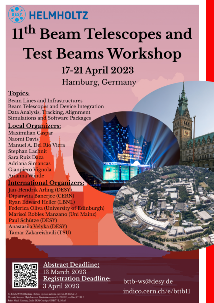Speaker
Description
The CERN RD50 collaboration developed several radiation-hard monolithic silicon
particle detectors (DMAPS) to study their usability for tracking and vertexing. The
most recent development is the so-called RD50-MPW3.
This sensor was fabricated in a 150nm High Voltage CMOS process by LFoundry and
consists of 64 × 64 pixel with a pitch of 62μm. Besides an analog front end, the chip
comprises a full digital readout and control unit. The detector was delivered in Sep.
2022 and has been under evaluation since then.
To study the performance of this detector in terms of spatial resolution, cluster-size
distribution, efficiency, and general tracking capabilities, beam tests (at CERN-SPS and
the Austrian medical facility MedAustron) have been performed.
For these tests, the chip utilized the Caribou-DAQ system and got integrated into the
well-established frameworks Peary and EUDAQ. The test beam analysis is performed
with the Corryvreckan framework. The DAQ system uses the AIDA-TLU for synchro-
nization purposes with a beam telescope.
In this talk, I will present some of the implementation details of the DAQ system,
like the (timestamped) synchronization concept and the 1GBit/s UDP data collector.
Furthermore, I will discuss several encountered problems and present the gathered test-
beam results.
